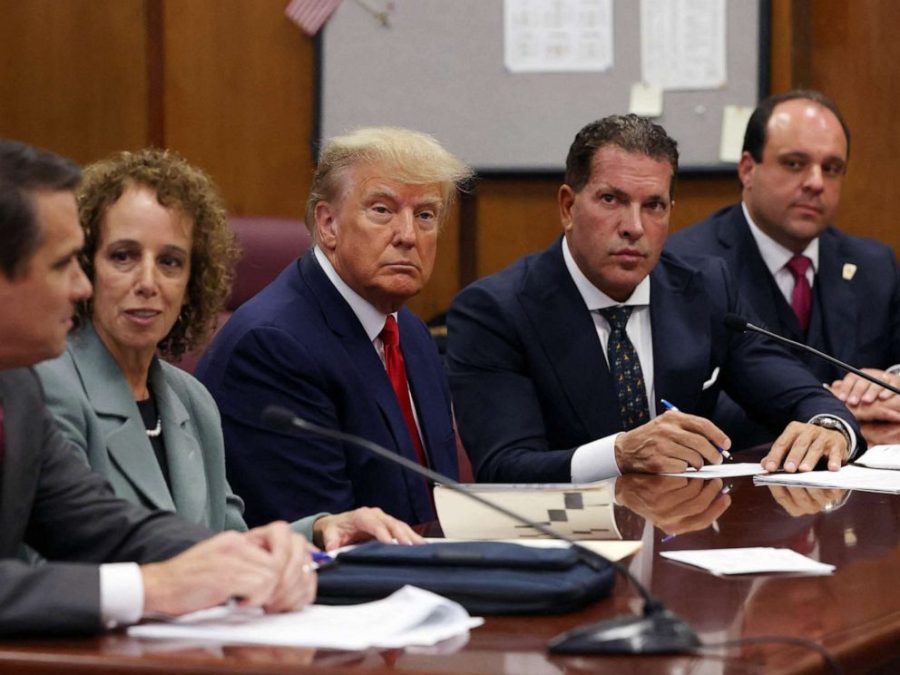Donald Trump’s Indictment: how did it happen?
Donald Trump is the first president to be accused of criminal activity.
Former president Donald Trump allegedly paid porn star Stormy Daniels 130,000 dollars in hush money to keep her quiet over an alleged affair between the two. Trump’s lawyer, Micheal Cohen, paid Daniels with his personal money in October of 2016, just days before the 2016 election.
Trump reimbursed Cohen (420,000 dollars over 12 months) for his payment using his personal money the following year, and the situation went public in January 2018 from the Wall Street Journal. In a statement to the New York Times, Cohen said “Neither the Trump Organization nor the Trump Campaign was a party to the transaction with Ms. Clifford [Stormy Daniels], and neither reimbursed me for the payment, either directly or indirectly … The payment to Ms. Clifford was lawful, and was not a campaign contribution or a campaign expendi ture by anyone.”
On March 6th of the same year, Daniels sued Trump. The non-disclosure agreement prohibiting her from discussing the alleged affair was never signed by him, prompting Daniels to ask the court to declare it null and void. Daniels’ attorney, Micheal Avenatti, released emails revealing that Cohen used his Trump Organization email when wiring the mon ey back in 2016. This completely negates Cohen’s previous statement above.
Two months later on May 3rd, Trump tweeted that “Mr. Cohen, an attorney, received a monthly retain er, not from the campaign and having nothing to do with the campaign, from which he entered into, through reimbursement, a private contract between two parties, known as a non-disclosure agreement, or NDA.”
Then, on August 21st, 2018, Cohen pleaded guilty to eight counts of fraud, tax evasion, and campaign finance violations all in regard to the hush money payment, as well as telling the Manhattan federal court that he was directed to make the payment by the President. Cohen was sentenced to three years in federal prison in December 2018.
In 2019, Manhattan DA Cyrus Vance Jr. subpoe nas the Trump Organization in order to investigate whether the company issued any false records to cover up the hush money payment, which would result in a state crime.
Despite Trump’s efforts to use his presidential sta tus as a way out of this investigation, the Supreme Court ruled against him on July 9th, 2020. Now with the obtained tax records, two of Trump’s companies and Allen Weisselberg (Trump’s chief financial advisor) were indicted on July 2nd, 2021 for fifteen counts by a Manhattan grand jury. The in dictments alleged that the guilty parties took part in a scheme which funneled over 1.7 million dollars of untaxed “indirect employee compensation,” though both parties pleaded not guilty.
On August 7th, Weisselberg pleaded guilty to his charges, and testified in November that Trump and two of his kids engaged in a scheme to defraud tax
authorities. A New York jury also found the two oth er companies guilty on all indictment counts. As for Trump and his children, Trump’s attorney denies he had any knowledge of the situation, and his children deny any part in it too.
Fast forward to 2023, when the case begins to rap idly pick up momentum.
On January 30th of this year, Bragg had a grand jury examine evidence over the hush money. Trump was invited to testify before the grand jury on March 9th, though he denied the opportunity, suggesting Trump himself could be soon facing an indictment charge. Unsurprisingly, many of his employees and supporters have been calling this whole process “in sane” or with the purpose of political harm, citing Bragg’s alignment to the Democratic Party. Though Trump did not testify, on March 13th and 15th Cohen did. Trump posted to his social media network on March 18th, made allegations of fraud in the 202 election, and asked his followers to “PRO TEST, TAKE OUR NATION BACK!”
Does this sound familiar? It certainly should. On March 30th, Trump was indicted by the grand jury, the first president in U.S. history ever to be involved in criminal activity. Finally on April 4th, Trump pleaded not guilty to 34 counts of falsifying business records in a Manhattan courtroom. It’s unlikely the trial will take place before next year, but new findings may emerge any day…



